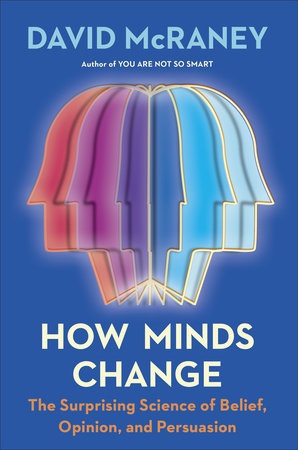“How Minds Change” by David McRaney
The author, with a degree in psychology and journalism, wrote previous books, had a podcast and generally made a living telling people there was no point in trying to change people’s minds. In particular, facts don’t change people’s minds. He presents what changed his mind as a story, trying to solve a mystery, starting when he learned of a group that had demonstrated success in changing people’s minds. Here are some takeaways from this book.
As social primates, we value being good members of our groups much more than being right. Brain scanners have showed that people challenged about political wedge issues have their brains go into fight-or-flight mode. Since accepting an alternate view to one’s group can lead to public shaming and worse, it is rational for people to reject facts. He gives the example of a barber in the fifth district of South Carolina asking customers to sign a petition to save polar bears from climate change. That barber would soon be out of customers or out of a job.
But if people are affirmed first, they are less likely to see new evidence as a threat. That “affirmation grows stronger if we’re reminded that we belong to several tribes and can rush to the safety of more amenable groups when the ones that judge us the harshest begin to feel less welcoming.”
He points out that intelligent people are the toughest to convince. Research shows more intelligent people are better at rationalizing and finding the 1% of “data” on the internet that supports them.
Posting facts to counter someone’s online posts not only doesn’t work, it backfires and makes them more resolute in their belief. The only benefit is to make you feel good – bolstering your credentials before your identity groups. If you really want to change someone’s mind, you have to do two things: [1] guide them to self-realization by asking the right non-threating questions (e.g., if they are against gay marriage, do they know any gays? Are they nice people?) [2] find their values and show them there is another identity group that will accept them with those values.
These are only snippets. I highly recommend this book to learn more.

